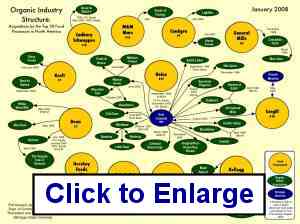Will Success Destroy Organic Foods?
Organic foods may be becoming a victim of their own success. Production can no longer keep up with demand, and many are saying that the initial ideals of clean, natural and healthy food have been sacrificed for profit.
In Europe, many fruits, vegetables and honey must now be imported from places as far away as Turkey and Latin America. For many, the organic philosophy is a profession of faith in a healthy lifestyle that respects the environment — a view that does not jibe well with tomatoes flown from Chile, generating pollution in the process.
For Wolfgang Gutberlet, head of the German supermarket chain Tegut: “Organic is not just the lack of toxic elements, it is something that looks at the entire production process.” Organic products sold in certain supermarkets, he argued, may not be suitable for purists.
Why Reading the Label on Your Bottle of Vitamin E May Be the Smartest Thing You Do Today |
| Learn More |
| Dr. Mercola’s Comments: | |
| Organic foods are now the fastest growing segment of the food industry in the United States, but as with so many things, bigger is not always better. I think most everyone can agree that the reason organic foods have become so popular is because they’re supposed to be better for your health. Some people also purchase them because of the notion that they use farming practices that protect the environment and reduce pollution. But if you are buying organic food with the idea that it’s being grown by a small “mom-and-pop” farm nestled somewhere in a green valley, I’m afraid you are being deceived. Many organic foods are now being produced by the giant corporations that make some of the most offensive junk food on the market. And with companies like Kraft, Pepsi, and General Mills now in the business of “organic,” is it any wonder that you can get organic soda, organic pizza, organic potato chips and just about any organic junk food you can dream up? The REAL Organic Industry Structure Please don’t misconstrue. There are still some small organic farms out there that are producing quality foods. But I think it’s important to get the word out that the “organic” label for the most part has been compromised. You cannot rely on it as an indicator of quality any more than you can the word “natural” or “healthy.”  Take, for instance, this chart (right) put together by Phil Howard, an assistant professor of Community, Agriculture, and Recreation and Resource studies at Michigan State University. It shows the organic processor acquisitions made by the top 30 food processors in North America, as of January 2008. Take, for instance, this chart (right) put together by Phil Howard, an assistant professor of Community, Agriculture, and Recreation and Resource studies at Michigan State University. It shows the organic processor acquisitions made by the top 30 food processors in North America, as of January 2008.This is how it’s now possible to get organic chocolate from Cadbury Schweppes, organic cereal from Kellogg’s, organic soup from Kraft, organic juice from Pepsi, and just about any organic product you can think of from Heinz. On one hand, you have to give them credit. These corporations have made “organic” a household term, and people who had zero access to organic foods just years ago can now probably find them with ease. On the other hand, a good portion of the organic products out there are no longer worth buying. Horizon (Dean’s) organic milk, for instance, actually comes from factory-style dairy farms where the animals are kept in intensive confinement and have been imported from conventional farms as calves. Wal-Mart has also been found guilty of deceptive organic labeling on several products, including Silk Soy Milk and Florida Crystals Natural Sugar, as well as various fresh produce items. And potato chips, cookies and candy will never be healthy, no matter how many organic ingredients they contain. Going Beyond Organic There is a growing movement underway that you may not have heard of. It’s called permaculture, and I believe it represents the future of healthy food. Michael Pollan, the New York Times author who wrote the book Omnivore’s Dilemma, does a great job of explaining it in this video. At its roots is a focus on the relationships between animals, plants, insects, soil, water and habitat — and how to use these relationships to create synergistic, self-supporting ecosystems. Permaculture strives to mimic the natural ecologies found in nature, and food that is grown by these natural laws will inherently be healthy. I can say with a significant amount of certainty that food being produced by the big-wigs like Kraft, General Mills, Coca-Cola, and Dean Foods is not done with the laws of nature in mind. Instead, it’s the law of making a profit that is steering the ship. This is not about shunning all organic food. On the contrary, if you can find fresh organic produce in your area, by all means snatch it up. But do be aware that the organic label is being vastly overused, and behind its overuse is often inferior quality. How to Find Healthy Food To find the freshest, healthiest foods out there, organic is often no longer good enough, so here are some guidelines to live by. 1. Frequent farmer’s markets, not your supermarket 2. Join a community-supported agriculture program if one is available near you (it allows you to buy produce, meats and other foods directly from the farm) 3. Take part in food coops in your area 4. Plant a garden; even a small space can produce a lot of fresh food 5. If you must shop in a supermarket, look for locally grown items, which are likely to be fresher than other foods | |


